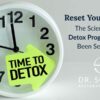My goal is to inform (and sometimes entertain if the mood strikes!), with articles I’ve read, my personal experiences, clinical experience and stories shared by my patients.
To delve right in, I cannot tell you how many patients I’ve seen who share common stories. Most start like this: “Well, my primary care doctor ran a TSH test (thyroid stimulating hormone), and said my levels are fine. I’m still experiencing (and fill in the blank here…. with ANY of the following): fatigue, hair loss, hair thinning, mental fog, insomnia, low sex drive, premature wrinkling, thinning of the skin, feeling tired, weak, or depressed, dry skin and brittle nails, not being able to stand the cold, constipation, and I could go on and on. Here is why you need a doctor who is willing to look at your TOTAL health and help you really put the pieces of the puzzle together.
LISTEN UP! Low thyroid causes or contributes to the symptoms of many conditions but the deficiency is often missed by standard thyroid testing.
A great article I read from the National Academy of hypothyroidism, states in part: Due to the differences in the pituitary’s response to physiological stress, depression, dieting, aging and inflammation as discussed, most individuals with diminished tissue levels of thyroid will have a normal TSH.
Doctors are taught that if active thyroid (T3) levels drop, the TSH will increase. Thus, endocrinologists and other doctors tell patients that an elevated TSH is the most useful marker for diminished T3 levels and that a normal TSH indicates that their thyroid status is “fine”. The TSH is, however, merely a marker of pituitary levels of T3 and not of T3 levels in any other part of the body. Only under ideal conditions of total health do pituitary T3 levels correlate with T3 levels in the rest of the body, making the TSH a poor indicator of the body’s overall thyroid status. The relationship between TSH and tissue T3 is lost in the presence of physiologic or emotional stress, depression , insulin resistance and diabetes, aging, calorie deprivation (dieting)), inflammation PMS chronic fatigue syndrome and fibromyalgia , obesity and numerous other conditions ( In the presence of such conditions, the TSH is a poor marker of active thyroid levels and thyroid status of an individual, and a normal TSH cannot be used as a reliable indicator that a person is euthyroid (normal thyroid) in the overwhelming majority of patients. Here’s the best method to diagnosis Therefore: Current best method to diagnosis
With increasing knowledge of the complexities of thyroid function at the cellular level, it is becoming increasingly clear that TSH and T4 levels are not the reliable markers of tissue thyroid levels as once thought.
This is especially true with chronic physiologic or emotional stress, illness, inflammation, depression and aging. It is common for an individual to complain of symptoms consistent with hypothyroidism but have normal TSH and T4 levels. While there are limitations to all testing and there is no perfect test, obtaining free triiodothyronine, reverse triiodothyronine, and triiodothyronine/reverse-triiodothyronine ratios can be helpful to obtain a more accurate evaluation of tissue thyroid status and may be useful to predict those who may respond favorably to thyroid supplementation . Many symptomatic patients with low tissue levels of active thyroid hormone but normal TSH and T4 levels significantly benefit from thyroid replacement, often with significant improvement in fatigue, depression, diabetes, weight gain, PMS, fibromyalgia and numerous other chronic conditions .
With an understanding of thyroid physiology, it becomes clear why a large percentage of patients treated with T4 only preparations continue to be symptomatic. Thyroxine (T4) only preparations should not be considered the treatment of choice and are often not effective in conditions associated with reduced T4 to T3 conversion, reduced uptake of T4 or increased T4 to reverse T3 conversion. As discussed above, with any physiologic stress (emotional or physical), inflammation, depression, inflammation, aging or dieting, T4 to T3 conversion is reduced and T4 will be preferentially converted to reverse T3 ( which acts a competitive inhibitor of T3 (blocks T3 at the receptor) ), reduces metabolism , suppresses T4 to T3 conversion ) and blocks T4 and T3 uptake into the cell.
While a normal TSH cannot be used as a reliable indicator of global tissue thyroid effect, even a minimally elevated TSH (above 2) demonstrates that there is diminished intra-pituitary T3 level and is a clear indication (except in unique situations such as a TSH secreting tumor) that the rest of the body is suffering from inadequate thyroid activity because the pituitary T3 level is always significantly higher than the rest of the body and the most rigorously screened individuals for absence of thyroid disease have a TSH below 2 to 2.5 . Thus, treatment should likely be initiated in any symptomatic person with a TSH greater than 2. Additionally, many individuals will secrete a less bioactive TSH so for the same TSH level, a large percentage of individuals will have reduced stimulation of thyroid activity, further limiting the accuracy of TSH as a measure of overall thyroid status. Reduced bioactivity of TSH is not detected by current TSH assays used in clinical practice.
So WHAT DOES ALL OF THIS MEAN?
Many patients are being treated with T4 only and not T3. When their symptoms don’t resolve or get worse, their doc ups their dosage of meds, which can cause WORSE symptoms. On top of that, they feel like their Drs. think they are just a MENTAL CASE. Let me assure you, it isn’t all in your head!
In another blog, I’ll share my PERSONAL experience with MY thyroid imbalance journey, but for today, here is the take away I want to stress! If you feel your Dr. isn’t truly trying to actively figure out why you are still having symptoms after lab work or treatment, you should find another physician who will. It is YOUR health, YOUR life. Partner with a healthcare professional who wants you to live it OPTIMALLY!
Yours in health,
Dr. Scott
This article originally appeared on Wellness.com





